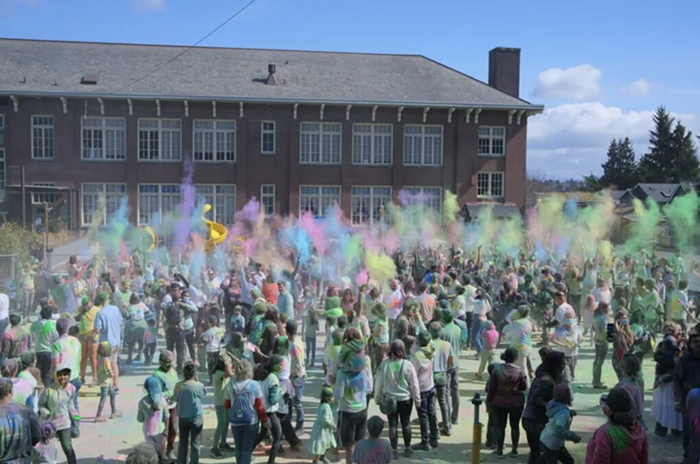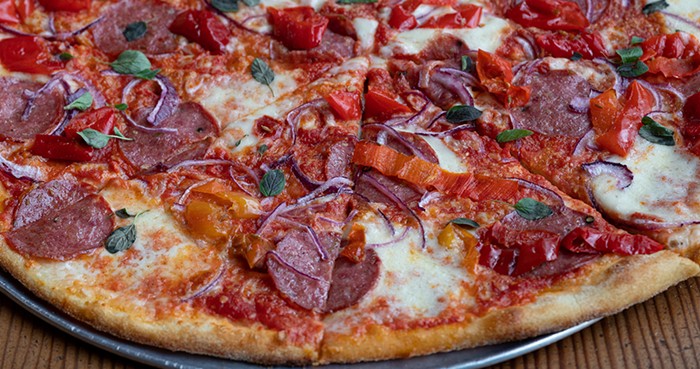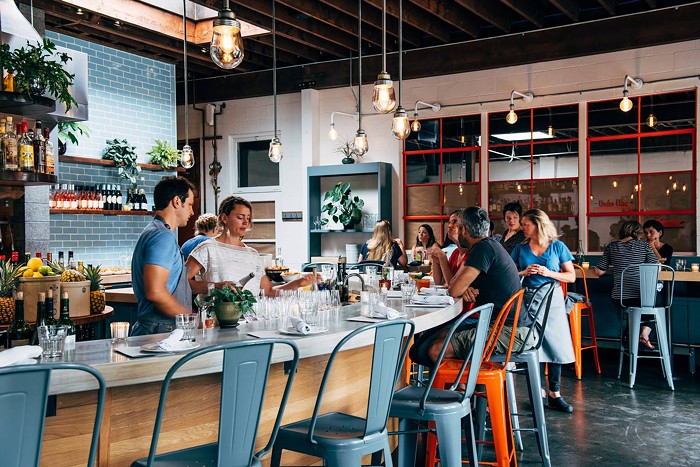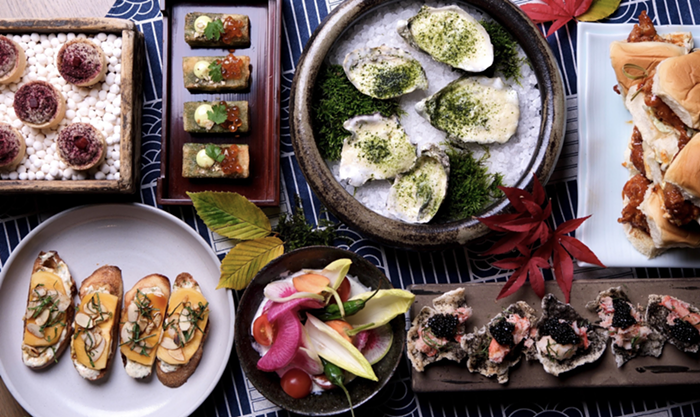
Last year, in an effort to make coverage of our city's intractable homelessness crisis more urgent, pointed, and inspiring of action, Crosscut launched the Homeless in Seattle project, an "all-out blitz" of homelessness coverage. This year, it falls on June 28, and outlets around the city will be posting their stories on the ongoing homelessness crisis along with the hashtag #SeaHomeless. The timing of my column doesn't work out to join in on the day of, but I want to weigh in anyway.
Thus, this week's column is about a rather simple sandwich, rather than some esoteric indulgence. Specifically, a pork sandwich from Pioneer Square's Grand Central Bakery. Normally, I eat the food item in question, enjoy it, and recommend it to you. But I didn't eat this sandwich and, as it was a seasonal special, it's not even currently on the menu. I have precious little to say about food this week. We can get back to $12 tartines next week, but this is important.
This story is about the man who did eat the sandwich: Jerry.
I met Jerry while working as a fill-in reporter for Real Change News last winter. One of the stories I was assigned was a walkthrough of the notorious Jungle. Jerry, a resident of the Jungle and a Real Change vendor, had generously volunteered to play tour guide. Just before I'd been hired, the city was rocked by a horrific triple murder there, and the walkthrough story was in response to a recent spate of very tough talk from local politicians about "cleaning up" the Jungle, as if the humans living there were so many pieces of garbage.
At Real Change, we wanted to do what I still think Real Change does better than anyone: Talk to the actual homeless people involved, and tell their stories as honestly as possible. Jerry had also volunteered to tell his own tale, which is what brought us to the arcade outside of Grand Central and the pork sandwich.
After a rather fruitless afternoon walking up and down the muddy tracks underneath the freeway, peering at empty tents, we'd decided to head back to Pioneer Square, where Jerry was hoping to link back up with some friends he'd lost earlier (every day is a phone-free day when you're living on the street). In hopes of finding a quiet spot by the office to record an interview, I offered to buy him lunch at Grand Central, thinking the arcade area would be mostly abandoned after the lunch rush.
It was, and after securing a sandwich for Jerry and a coffee for me, we grabbed the end of one of the arcade's long communal tables. That bygone pork sandwich was no show pony—not in the way that some of Rain Shadow Meats' more outlandish creations are—but it was definitely a lunchtime workhorse, and watching Jerry eat it was a profound moment in and of itself. I realize how creepy this sounds, watching someone eat, but there wasn't much else to do, sitting there with my "You Might be a Doer" lunch. They say you can tell food is good when people are silent, and he certainly wasn't answering any interview questions mid-sandwich. He was far too busy devouring the thing.
Indeed, he waxed poetic about it between bites. He was, I would even venture, moved by it. I couldn't help but feel like I was watching a man eat for the first time after escaping a POW camp. Like, despite all the Costco muffins and white rice and frozen breaded chicken cutlets this city's "feeds" give homeless people every day, he was ravenous. I think he was, just perhaps not in the caloric sense. It might sound woo woo, and it is certainly obnoxious when chefs talk about how "love" is their secret ingredient, but I do think intention is an an honest-to-goodness, discernible component, and I think it's every bit as essential as salt. Rarely do homeless people get to eat food that has been prepared in such a way that communicates a desire on the part of the preparer that one not only be sated by the food, but actually be elated by it. Certainly the volunteers at "feeds" care a whole helluva lot about the people they're feeding, but their very purpose—feeding as many people as possible as quickly as possible—precludes that level of intention that, for lack of a less cheesy phrase, nourishes the soul. That's a shame.
However, that was not to be my only revelation of the day. As the interview was winding down, a friend of Jerry’s who he’d greeted on our way in through Occidental Park popped inside to shoot the breeze a bit and polish off the tail end of Jerry’s potato chips. Shortly after, the arcade’s security guard walked over to have a look see.
"Hey guys, how's everything going?" she opened, pretty obviously about to ask Jerry and his friend to move it along. I quickly explained that we were finishing up an interview for Real Change, and we'd only be another moment. Seeing my only moderately frumpy button up and iPhone was all the assurance she needed that I was not also a homeless person, and that she could stand down. After a bit of amicable small talk, she left us to it. It was maybe a three minute interlude at most.
I realized soon after what, exactly, had transpired in that brief interaction, and I haven’t been able to get it out of my head since. In the moment, I took her concern in stride, just what you'd expect any security guard to do if a couple of apparently homeless folks decided to plop down in the area they were guarding. Me, a housed, privileged person, thought, "Oh, yup, she's just doing her job." As I began to unpack it, though, I realized how damaging that interaction was to people like Jerry. She didn’t approach aggressively, and she was perfectly polite to all parties, but the simple fact that Jerry sitting there eating a recently and legitimately purchased sandwich was cause for her to “check-in” said everything he needed to know to feel unwelcome. To feel othered. The fact that, once I'd explained that I worked for Real Change and we were doing an interview, once I'd provided him with a "normal" chaperone, everything was okay, that also spoke volumes.
Thinking back on his body language response to her approach still breaks my heart—he hunched his shoulders ever so slightly, giving her the look you give someone who is about to strike you, that wan, wavering flinch. The fact that his happened almost unconsciously reminded me that this was not an isolated incident, but rather a fact of his life. He was clearly used to this. That, to me, is absolutely unconscionable.
We treat people experiencing homelessness like they are undeserving of experiences as basic as ordering lunch and sitting down at a nice table to enjoy it, experiences that the rest of us take wholly for granted. We often act like a homeless person simply being in the same space as non-homeless people is a disturbance, even if they haven't uttered a peep. We clutch our pearls and raise an outcry when a homeless person chooses to spend the little money they've accumulated on a consolatory beer or a pack of smokes, little indulgences that the rest of us use to ease stress unthinkingly.
What I think we fail to understand, when we casually deny these freedoms to those experiencing homelessness, is that we are denying them their basic personhood. We deny them admittance to these small but important moments of the human experience, then we marvel at why they can't just reintegrate into society. Could it be that we’ve been drilling it into their head that they’re not a part of society? That they aren’t worthy of even the most minor creature comforts until they’ve worked and toiled and clawed their way back into some arbitrary state of social grace?
I wish I was only speaking to the Cindy Pierces of the world here, but I see even the most woke bros looking down their noses at the daytime denizens of Occidental Park. I see the most well-meaning service providers and city staffers and elected officials referring to “the homeless” only in terms of numbers and statistics and policies. I see a lot of good work going to waste because many of us cannot accept the simple, fundamental truth that homeless people are still people, at least not on a gut level.
This column is not asking you to fix homelessness by buying a sandwich. It's asking you to do something very, very simple, and very necessary before we can even begin to talk seriously about “fixing” homelessness: Start treating homeless people like people.


















